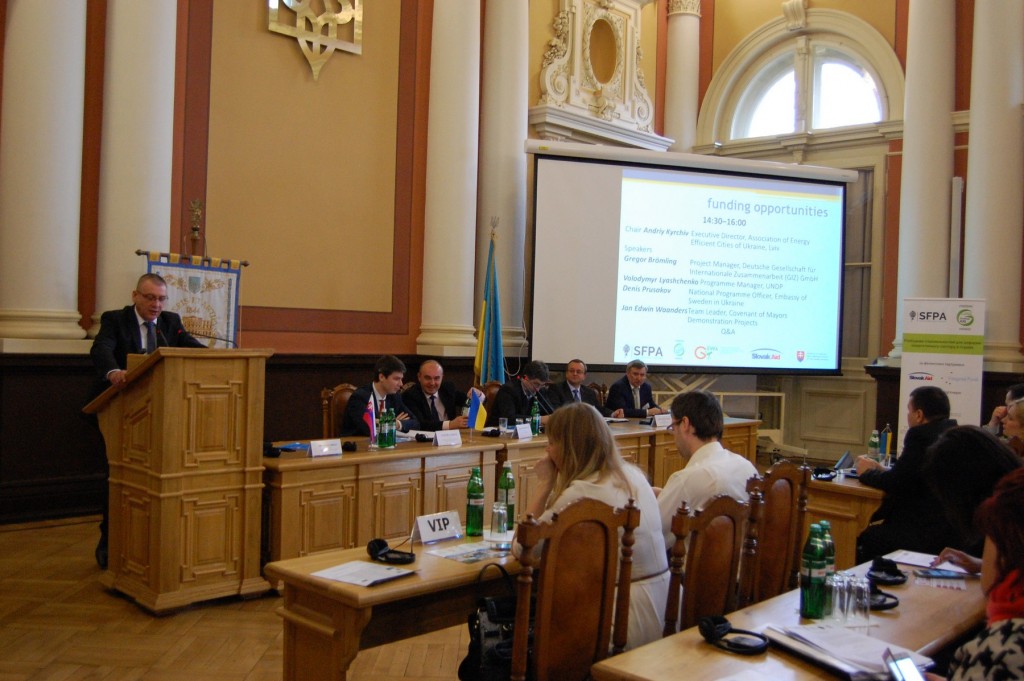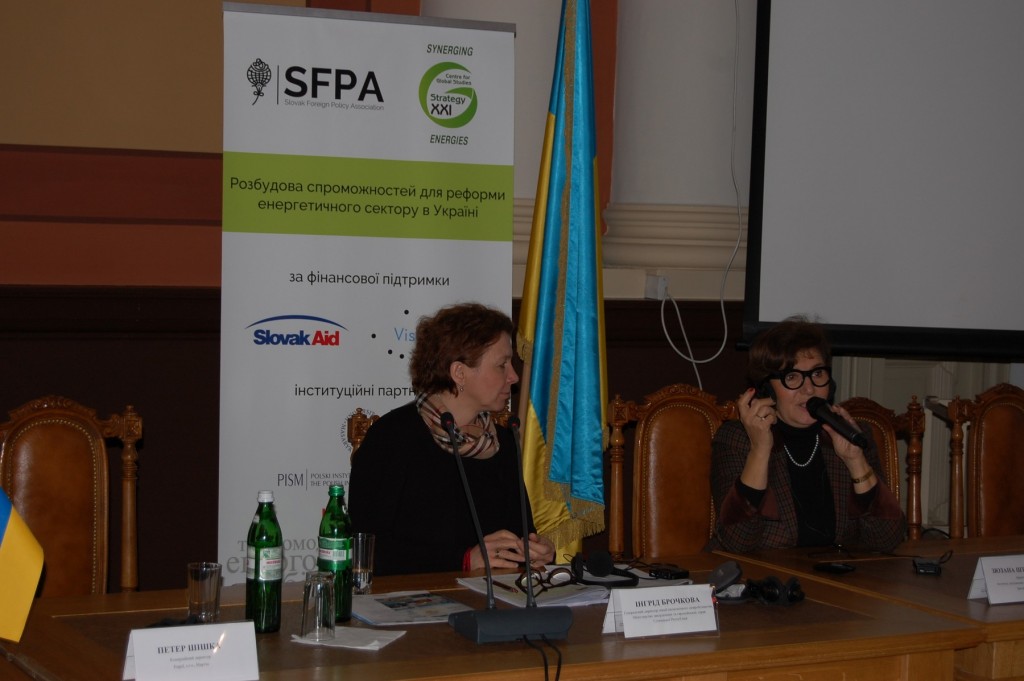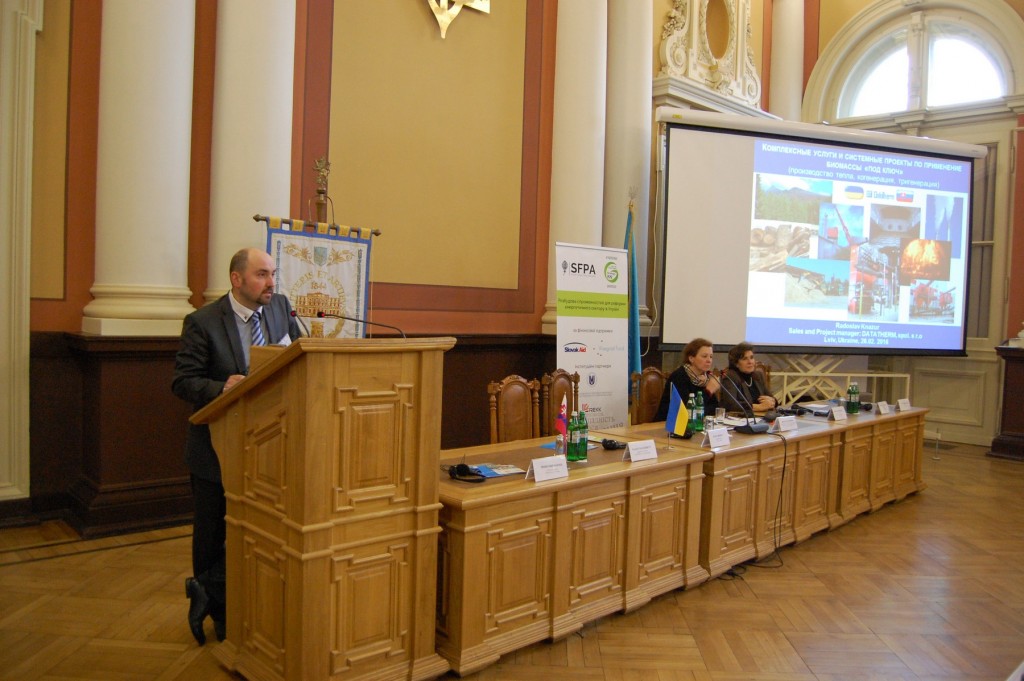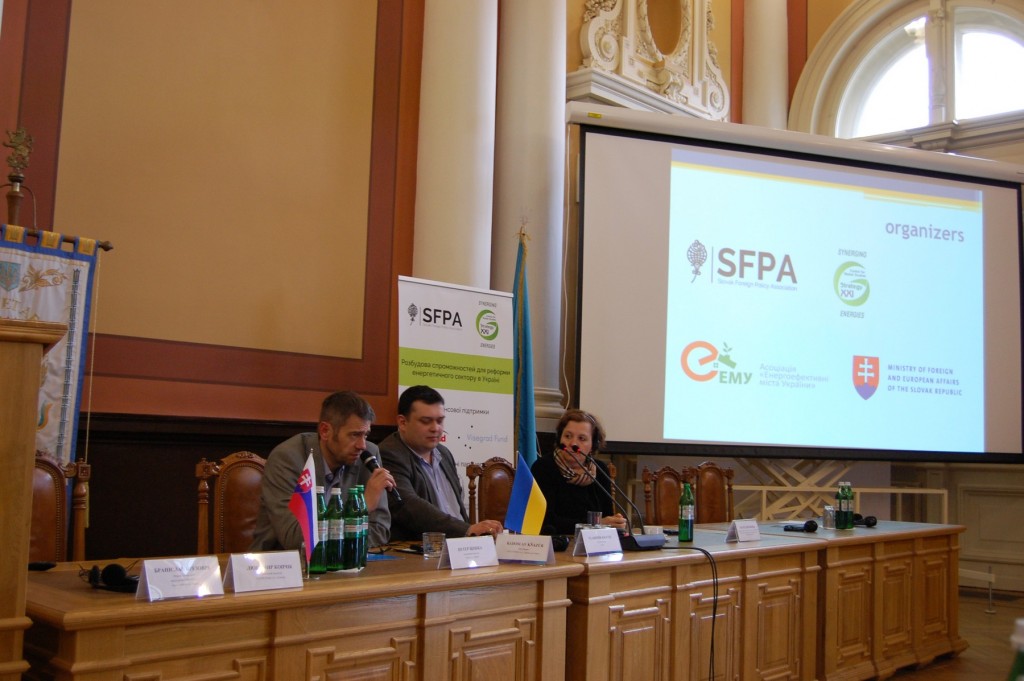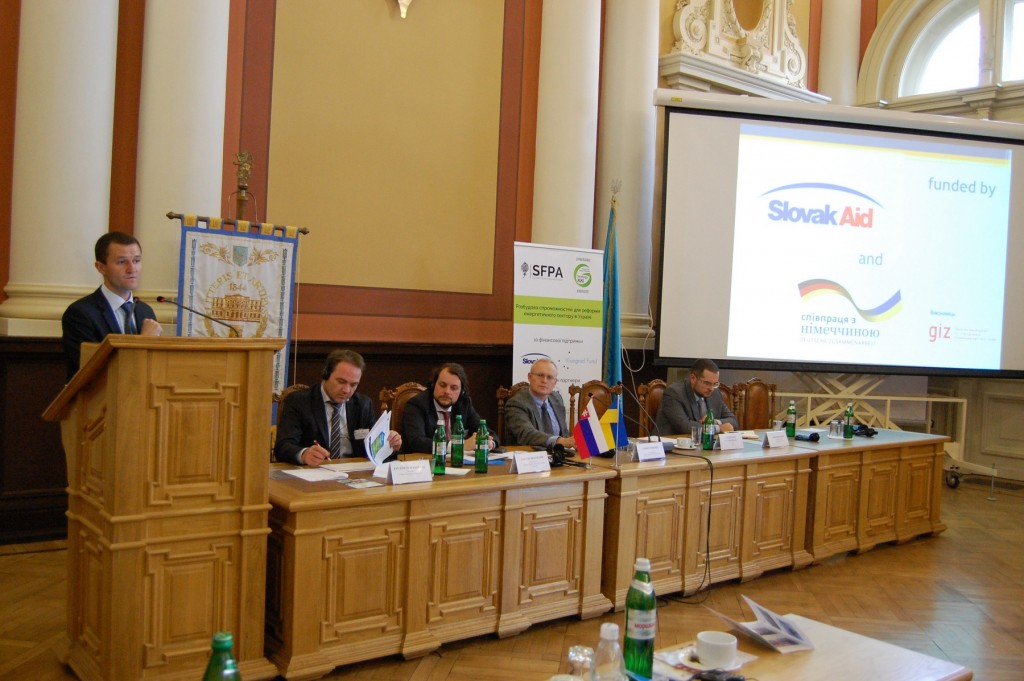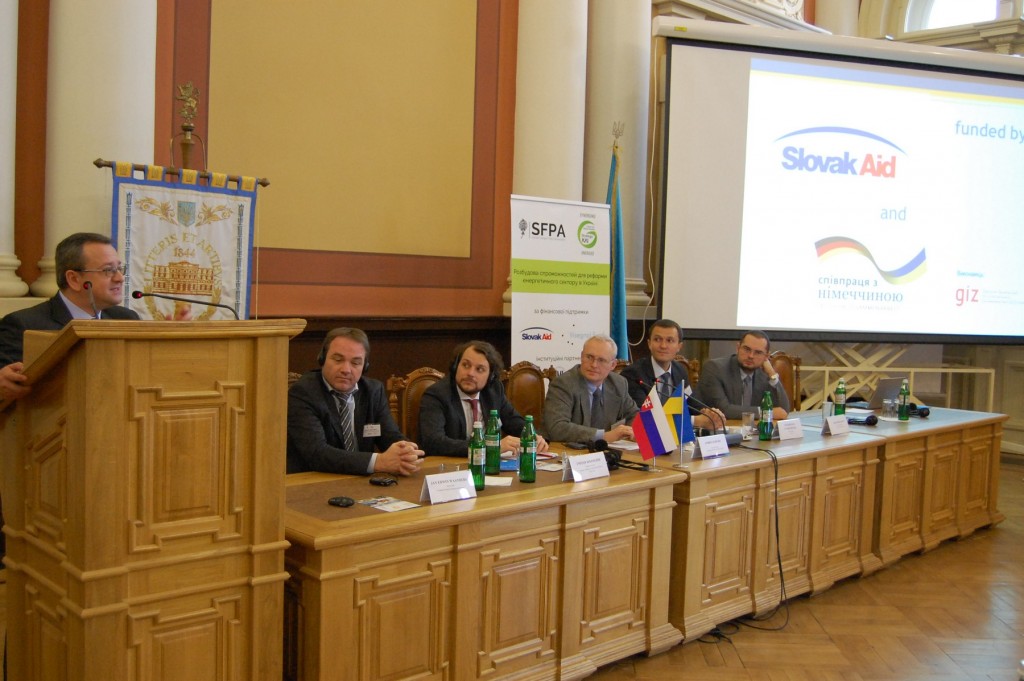Promoting energy efficiency in Ukraine: the best practices from Slovakia
26. februára 2016 - Lviv Polytechnic National University, 12 Bandera Street, Lviv
Date: February 26, 2016
Venue: Lviv Polytechnic National University, 12 Bandera Street, Lviv
Organizers: Slovak Foreign Policy Association, Centre for Global Studies: Strategy XXI (Kyiv) and Association of Energy Efficient Cities in Ukraine with the support of SlovakAid, Lviv City Council, Lviv Oblast State Administration, Deutsche Gesellschaft für Internationale Zusammenarbeit (GIZ) GmbH and the Embassy of the Slovak Republic to Ukraine
Languages: English, Slovak and Ukrainian (with simultaneous translation)
Goal: The aims of this event are first for Slovakia to share its experiences with Ukrainian partners in improving energy efficiency and the use of renewables, including best practices at the municipal level; second, to explore financial opportunities for funding energy efficiency projects in Ukraine; and third, to present successful projects from Slovakia. The event will be held under auspices of Minister of Economy of the Slovak Republic Vazil Hudák.
Warning: Invalid argument supplied for foreach() in /data/7/9/795d260e-a882-4303-97db-7ccfaba621b2/sfpa.sk/sub/archiv/wp-content/themes/twentyfourteen/single-event.php on line 70
On February 26, 2016, the Slovak Foreign Policy Association and the Centre for Global Studies: Strategy XXI organized an event on successful energy efficiency projects in Slovakia, Promoting Energy Efficiency in Ukraine: best practices from Slovakia, in cooperation with the Association of Energy Efficient Cities in Ukraine and with the support of the Embassy of Slovakia to Ukraine, Lviv City Council, Lviv Oblast State Administration and Lviv Polytechnic National University. The event was funded by SlovakAid and Deutsche Gesellschaft für Internationale Zusammenarbeit (GIZ) GmbH.
The overall goal was to share Slovak experiences with Ukrainian partners in improving energy efficiency and the use of renewables, including best practices on the municipal level, and to explore financial opportunities for funding energy efficiency projects in Ukraine, accompanied by presentations on successful projects from Slovakia.
The event was launched by Mykhailo Gonchar, Director of the Centre for Global Studies: Strategy XXI, who highlighted the leading role of Lviv and Lviv Region in promoting energy efficiency. This was followed by welcome speeches by leaders from Lviv Region State Administration and Lviv Regional Council, with deputy head Yurii Pidlisny and Volodymyr Hirniak.
Alexander Duleba, Director of the Research Center of the Slovak Foreign Policy Association, welcomed the delegates and introduced Miroslav Obert, State Secretary from the Ministry of Economy of the Slovak Republic. Alexander Duleba emphasized that the aim was to share with Ukraine Slovakia’s experiences of energy efficiency improvement on the municipal level and to present key projects implemented in cities and towns by Slovak companies which could be repeated in Ukraine using the financial opportunities (investments and grants) available from international and national donors. He challenged state authorities to accelerate the legislative process so municipalities and communities can implement the energy efficiency measures according to need and challenge. The second problem he highlighted is related to the lack of financial support because of high interest rates.
Miroslav Obert discussed a key report on the energy efficiency responsibilities of the Slovak Ministry of Economy. Slovakia’s energy policy was conceived of as a basic means of reducing energy consumption and developing the energy sector. A key condition to Slovakia developing a solid regulatory and legal framework that would ensure significant progress in energy efficiency is the adaptation of EU directives. The main implementation tool is the energy efficiency action plan adopted in seven year cycles. It enables progress to be assessed and improvement measures to be proposed or further steps to be developed in order to achieve the 2020 energy efficiency targets. The government has financed energy efficiency programs, set out provisions and incentives, introduced support mechanisms to overcome bureaucratic barriers, prepared and implemented action plans to shift action to the local and municipal levels, and has supported and made available energy auditors. An effective system of measures designed to achieve energy efficiency targets should be introduced from the very beginning, as it is much costlier to correct errors at the later stage. Slovakia still has several challenges ahead of it, such as the need to increase the number of experienced experts working for the Ministry of Economy and the Slovak innovation and energy agency, to ensure the effective use of public funds for energy efficiency and to enhance interministerial cooperation as well as to ensure good quality monitoring of the work conducted with improvements being made if required.
Kostiantyn Gura, from the SAEE, delivered a welcome speech that gave a broad overview of drafting laws on metering, renovations, and monitoring and promoting energy efficiency in Ukraine.
Andriy Kyrchiv, Executive Director of the Association of Energy Efficient Cities in Ukraine from Lviv, highlighted several crucial issues facing Ukraine. The biggest energy consumers are cities, their inhabitants display a low level of self-organization, the infrastructure is outdated and public services are monopolized. One of the most challenging issues are the subsidies which deplete the state budget and create social tensions between those who pay outright (around 11 million consumers) and the 4 million who receive subsidies. The Covenant of Mayors is a positive initiative which provides support for cities and municipalities by developing action plans and providing access to affordable loans and grants.
Ingrid Brocková, Director General of the Economic Cooperation Section at the Slovak Ministry of Foreign and European Affairs, chaired the Slovak presentations (by experts and the business sector) on insulating buildings, district heating, public lighting and other projects implemented in Slovakia.
Zuzana Sternová, Director of the Building Testing and Research Institute in Bratislava, spoke about issuing certifications for buildings and the process of thermo-modernization. Slovakia introduced systematic and regular monitoring and modernization of public buildings and housing, starting with the directive on the energy performance of buildings. The Building Testing and Research Institute implemented a large scale assessment of residential and public buildings and has one of the largest databases providing up-to-date information on these buildings. It also helped to develop up-to-date statutory guidelines for construction work and the subsequent modernization of existing stock.
Radoslav Kňazúr, Sales Manager with Datatherm, s.r.o. from Teplička nad Váhom gave a presentation on his company’s experiences of local biomass fuels in Slovakia. The company provides comprehensive solutions from consultation to the construction and maintenance of buildings run on local biomass. These involve heat only or combined heat and electricity production with flexible use of the available resources, for instance due to seasonality.
Ľubomír Kopčík, CEO, KOLBE Group, s.r.o. from Košice, spoke about the process his company uses from the preparation to the burning of chips. Another possible avenue is municipal solid waste, which is of greater importance in cities and towns. The company produces chips for its own needs, sells to other interested parties and provides logistics support. The company designs heat generation projects for substituting existing gas or other fuel based boiler stations with the aim of adding cogeneration. KOLBE Group can perform full energy audits for cities and develop ideas to modernize heat and cogeneration infrastructure, and also perform maintenance and supply biomass fuels.
Peter Šiška, Commercial Director at Engul s.r.o. in Martin presented the company’s main portfolio and cogeneration projects. Engul has developed different solutions that use a prime energy source and are equipped with low, medium or high performance engines or need hot water at a special temperature. The company also specializes in producing heat from mineral oil, hot air, cold air and CO2. Another area it deals with is municipal solid waste and the production of varying qualities of biogas for cogeneration.
Branislav Brezović, speaking on behalf of Stroje, s.r.o. Lighting Division in Martin presented several projects on public lighting in Slovak cities. These were mainly driven by the need to find solutions where municipal funding was lacking but there was a need to ensure proper future modernization. Therefore he presented the EPC project financing.
He also presented on behalf of SA s.r.o on making energy efficiencies when using gas, water and electricity by detecting critical issues through measuring and regularly controlling average consumption.
Vladimír Kravec, from Steinzeug Keramo in Košice, stressed that, along with energy efficiency, the security of the environment is very important. The company produces ceramic drain pipelines, one of the most effective and long-term solutions, whilst maintaining high environmental standards. It provides solutions for communal waste management using the above products, ensures systems are eco-friendly, that the work is consistent and there is a return on investment. By installing ceramic pipelines, cities can rely on the communal system needing repaired only one in almost 100 years of operation.
The panel session was followed by a number of questions from the delegates, which it is hoped will result in new initiatives and common projects.
The next panel was devoted to financial opportunities and how to finance energy efficiency measures. The panel was chaired by Andriy Kyrchiv and panelists gave presentations on the financial mechanisms available for energy efficiency projects.
Gregor Brömling, Project Manager at Deutsche Gesellschaft für Internationale Zusammenarbeit (GIZ) GmbH gave a presentation on energy efficient projects in the housing sector, municipalities and businesses among other topics. Sixteen municipalities in Ukraine are currently receiving support from GIZ to help them improve energy management, SEAAP, perform energy audits and obtain small grants for pilot projects. Knowledge is more important than money, since knowing what is needed means the right projects can be implemented and the appropriate solutions can be found with a modicum of external support. Having good project documentation, prepared with the support of GIZ, may lead to further loans or grants being awarded by big international donors, such as WB, EBRD, NEFCO etc. Energy monitoring could result in around 10 per cent of savings, building retrofits in more than 40 per cent and street lighting improvement in around 50 per cent; however, all these involve significant investment.
Energy efficiency could become a significant driver for developing private business and growing local medium and small business resulting in many new jobs.
Volodymyr Lyashchenko, Project Manager with UNDP, provided information on sustainable development projects and comprehensive eco-friendly solutions. UNDP seeks to support nation-wide projects and programs which obtain significant results. It backs the creation of an energy efficiency body in Ukraine that would remove the obstacles facing condominiums and green cities. UNDP does not agree with the current pilot projects and plans to implement comprehensive solutions in cities. It considers biomass to be a challenge for Ukraine given the lack of forests, which makes it hard to cover demand locally throughout the country. By contrast agriculture waste could prove attractive locally and solve the problem regarding the lack of available regional fuels. By 2019 UNDP expects to have introduced a new program providing financial support cities and towns in Ukraine.
Denis Prusakov, National Program Officer at the Embassy of Sweden to Ukraine discussed Swedish financial and technical support. Sweden is one of the biggest supporters of Ukraine’s EU ambitions and is interested in Ukrainian development and EU integration, the promotion of democracy and human rights, harmonization of natural protection standards and securing a functioning energy sector and fostering a strategy of cooperation.
Jan Edwin Waanders, Team Leader with the Covenant of Mayors Demonstration Projects, spoke about their new EU initiatives to support Ukraine. They provide support by applying for loans from international financial institutions, providing the specific requirements and project documentation. There is potential to be found in revolving funds created by municipalities or other organizations. An energy efficiency fund could be another means of financing small and medium projects.
The directors of the SFPA and Strategy XXI – Alexander Duleba and Mykhailo Gonchar – delivered the concluding remarks and summarized the outcomes of the event and called for dialog and the exchange of experiences between interested parties.
Uskutočnené podujatia
Slovenská spoločnosť pre záhraničnú politiku
